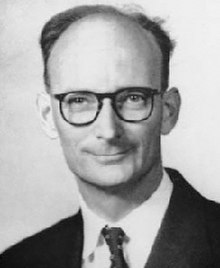
Back جون لانجشو أوستن Arabic جون لانجشو اوستن ARZ Джон Лангшоу Остин Bulgarian জন ল্যাংশ অস্টিন Bengali/Bangla John Langshaw Austin Catalan John Langshaw Austin Czech J.L. Austin Danish John Langshaw Austin German J. L. Austin Spanish John Langshaw Austin Estonian
J. L. Austin | |
|---|---|
 | |
| Born | 26 March 1911 Lancaster, England |
| Died | 8 February 1960 (aged 48) Oxford, England |
| Alma mater | Balliol College, Oxford |
| Era | 20th-century philosophy |
| Region | Western philosophy |
| School | Analytic Ordinary language philosophy/linguistic philosophy Correspondence theory of truth[1] |
Main interests | Philosophy of language, philosophy of mind, ethics, philosophy of perception |
Notable ideas | Speech acts, performative utterance, descriptive fallacy, linguistic phenomenology[2] |
John Langshaw Austin OBE FBA (26 March 1911 – 8 February 1960) was an English philosopher of language and leading proponent of ordinary language philosophy, best known for developing the theory of speech acts.[5]
Austin pointed out that we use language to do things as well as to assert things, and that the utterance of a statement like "I promise to do so-and-so" is best understood as doing something—making a promise—rather than making an assertion about anything. Hence the title of one of his best-known works, How to Do Things with Words (1955).
Austin, in providing his theory of speech acts, makes a significant challenge to the philosophy of language, far beyond merely elucidating a class of morphological sentence forms that function to do what they name.
Austin's work ultimately suggests that all speech and all utterance is the doing of something with words and signs, challenging a metaphysics of language that would posit denotative, propositional assertion as the essence of language and meaning.
- ^ The Correspondence Theory of Truth (Stanford Encyclopedia of Philosophy)
- ^ John Langshaw Austin (1911—1960) – Internet Encyclopedia of Philosophy
- ^ a b John Langshaw Austin (Stanford Encyclopedia of Philosophy)
- ^ Dancy, Jonathan. "Harold Arthur Prichard". Stanford Encyclopedia of Philosophy. Retrieved 19 June 2012.
- ^ Warnock, G. J. "John Langshaw Austin, a biographical sketch". Symposium on J. L. Austin, ed. K.T. Fann. New York: Humanities Press, 1969. p. 3.